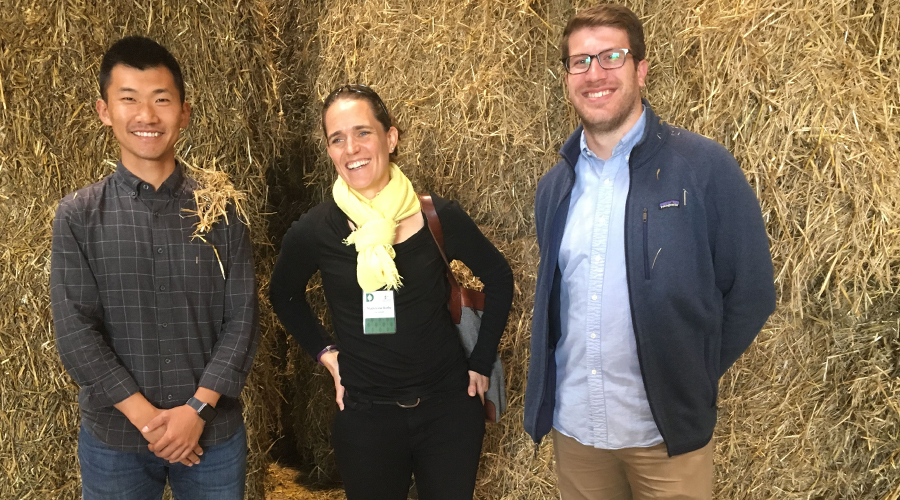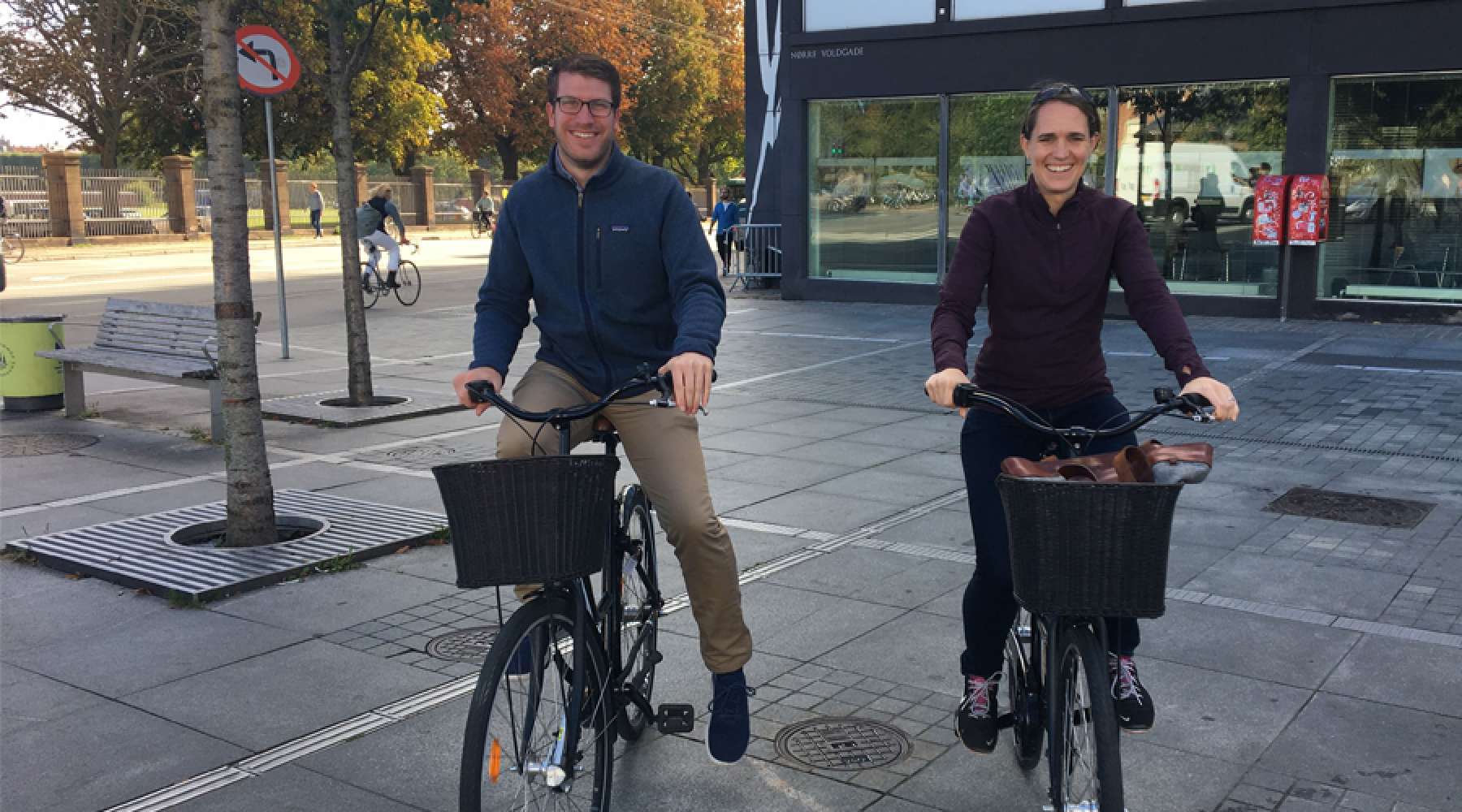May 03, 2021
Why I Wish I Was a Tuck MBA Exploring the Intersection of Climate Change and Business
By Madeleine Bothe
Assistant Director, Revers Center for Energy
Sometimes I wish I was a Tuck student exploring the intersection of climate change and business. Let me explain.
Prior to Tuck, I enabled and empowered post-graduate level students to take their science focused master’s degree and commercialize their ideas that hatched in the lab and create a business. I was based in London, UK but led a team across different countries in Europe to ensure that in five weeks, students visited at least two cities in Europe and explored the “pain points” attributed to climate change.
For example, pollution in major capital cities created ideas such as improving urban design, integration of smarter utilities and mobility, and improving current city resources to reduce carbon output (think heating and cooling buildings and capturing heat from urban transportation). As a year-round cyclist in London (fortunately came out unscathed), I pitched to students that improving cycling infrastructure in London would be an easy win to reducing congestion. Students came up with business models for pollution sensors attached to bicycles to collect data, creative business models for more cyclists to take to the roads, smart engineering ideas to adjust existing infrastructure, and more. Given that European countries are small, efficiency in agriculture was also a hot topic and a student brought to market a shipping container retrofitted as an aquaponics system to grow microgreens on disused site in inner cities. It was so inspiring, to say the least!
What does this have to do with Tuck and you? After my career with Climate-KIC, a start-up when I joined them, I felt equipped to join Tuck as an ambassador to climate change innovation. As future business leaders, regardless of your chosen career, industry, or role, you will make decisions based on climate change as a strength, weakness, opportunity and/or threat to your organization. I started this career in the Revers Center for Energy Center at Tuck, but I now also support the Center for Business, Government & Society. I found they are both uniquely positioned to address and overlap on global issues such as climate change from all angles: energy, policy, business, marketing, local versus national or international, and even for those pursuing finance and consulting jobs to prepare you for these peak moments in your career.
The two Centers offer co-curricular programming through myriad avenues but experiential learning is our strength. We enable students to contextualize and customize their Tuck education and here are a few examples:
- Impactful internships are a way to gain experience in a field you may not be able to explore after your MBA. The Center for Business, Government & Society and the Revers Center for Energy have special funds to make these unique opportunities a reality. For example, Tobin Krieg T21 spent his summer tackling climate change with the Gulf of Maine Research Institute’s investment team. GMRI would not typically have the financial means to host an MBA intern but with support from Centers that want students to explore climate change as a career option, everyone wins! Grant Schaller T’21 also did an internship with GMRI and Deep Green Solar, a Tuck-alum-founded spinoff of a private equity firm that finances solar projects. Posie Holmes T’21 describes her experience planning a CBGS Fellows Seminar on “Intersectional Environmentalism and Carbon Pricing” where her co-Fellows each brought a climate-related internship or work experience to the discussion.
- Partnerships around campus. In my experience (and I’m sure yours too), collaboration = impact so having access to a network of different resources on your doorstep will make your Tuck experience that much more valuable. Revers Center for Energy and the Center for Business, Government & Society have strong cross-campus connections and resources so we aim to open the door to make all the opportunities available to you too:
- The Revers Center for Energy and the Center for Business, Government & Society are heavily involved in TuckGO which hosts Tuck’s immersive and international experiential courses. April Salas, Executive Director of the Revers Center for Energy, has led an annual Global Insight Expedition (GIX) examining Morocco’s New Energy Future where students witness the gateway of large-scale renewable energy infrastructure to the rest of the continent. John McKinley, Executive Director of the Center for Business, Government & Society leads the Climate Challenges and Opportunities: Transitioning to Sustainable and Resilient Economies for a Low Carbon Future GIX to explore how businesses and governments are responding to the material risks and opportunities associated with climate change. Finally, TuckGo First Year Projects have worked on projects for clients who prioritize climate change adaptation and resiliency in their business models such as Irving Oil, Clean Marine Energy, Cypress Creek Renewables, CrossBoundary, Ambri, Norwich Technologies, Danaher, and Ecolab.
- Independent projects with support from Centers are a unique way for students to bridge their classroom learning and apply it to a short-term, real-world scenario that is close to home. For example, past Revers Center for Energy independent projects include Validating Greenhouse Gas Emissions Accounting for a local Private Equity firm, and several projects on carbon emission and clean energy blockchain (the trend toward sustainability accountability). These projects enable students to support the local community while also accumulating a tangible resume booster. The Center for Business, Government & Society Non-Profit Board Fellows program is also a great example of students giving back to the community using their pre-Tuck experience and gaining experience board-member. Organizations include Upper Valley Trails Alliance, Vital Communities, and the Vermont Institute for Natural Science who are all advocates for nature, sustainability, and the climate.
- Tuck Social Venture Fund, a student-run early-stage investment fund that explores a huge range of early-stage companies. They invest in for-profit social enterprises that deliver a measurable social impact and financial return. The fund is also aimed at facilitating experiential learning opportunities for the next generation of leaders in impact investing. The Centers also support Tuck Sustains, a student-run club focused on raising sustainability issues on- and off-campus!

Admittedly, I got carried away here with so many climate change related programs and initiatives but I wanted this to be a one-stop shop to all the ways that your MBA experience can support the fight against climate change regardless of which career path you follow. I didn’t even mention some of the amazing speakers we have had to campus and they all talk about climate change as a huge part of business in the future. Just to name a few: Secretary Madeleine Albright, Beto O’Rourke, Governor Deval Patrick, and Auden Schendler, Vice President of Sustainability, Aspen Skiing Company.
The Revers Center for Energy is building a thriving energy community at Tuck, Dartmouth, and beyond as we work to inspire and shape tomorrow's leaders in energy while engaging today's energy community. We believe that regardless of industry, tomorrow's wise leaders will need to make informed energy, climate change, and sustainability decisions during their careers that drive innovation for a sustainable future.
The Center for Business, Government & Society empowers business leaders to navigate immediate stakeholder interests and the broader, deeply intertwined interests of both governments and society to help build a more sustainable global economy and contribute to the common good.


